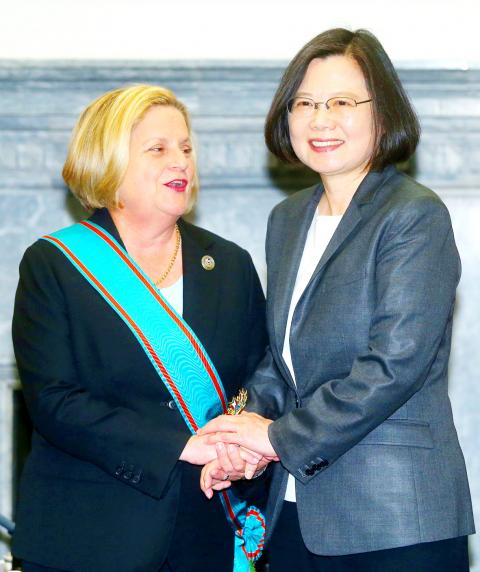A US lawmaker yesterday urged Washington to increase Taipei’s political, economic and military capabilities in the face of Beijing’s growing aggression.
US Representative Ileana Ros-Lehtinen, a former chairwoman of the US House of Representatives Committee on Foreign Affairs, made the remarks in a speech at the Presidential Office yesterday morning, after receiving the Order of Propitious Clouds with Special Grand Cordon from President Tsai Ing-wen (蔡英文) for her promotion of Taiwan-US ties over the past 30 years.
With the 39th anniversary of the Taiwan Relations Act just eight days away, Ros-Lehtinen said she was proud to say that the relationship between Taiwan and the US is stronger than ever.

Photo: CNA
“For as long as I am in Congress ... Taiwan and the issues that are important at the face of this island-nation have been near and dear to my heart,” she said.
Lauding Taiwan’s vibrant economy, open society, free media, freedom of expression and respect for human rights, Ros-Lehtinen said these elements are why Taiwan is the US’ natural partner and why it is important for Washington to ensure that “Taiwan remains Taiwan.”
“Whether it is a new trade deal, a new weapons system, increasing ties in Latin America, strengthening of participation in all sorts of international organizations, we have got to work together to ensure that Taiwan has all the tools that she needs to protect itself from Chinese aggression and coercion,” she said.
Tsai said in her speech that the US’ enactment on March 16 of the Taiwan Travel Act, which encourages high-level visits by Taiwanese and US officials, was due to the US Congress’ staunch support for Taiwan.
The strong bilateral ties that the two nations have are the accumulated results of the collective efforts of many people, Tsai said, encouraging Ros-Lehtinen to visit Taiwan more often.
Earlier yesterday, the Ministry of Foreign Affairs issued a statement welcoming Ros-Lehtinen and her delegation after their arrival on Sunday for a three-day visit.
The delegation also includes US Representative Claudia Tenney, who was elected in 2016, the ministry said, adding that Ros-Lehtinen and Tenney are both are members of the Congressional Taiwan Caucus and important allies to Taiwan in the US Congress.
“During her term as committee chairwoman, Ros-Lehtinen held two hearings on ‘Why Taiwan matters’ In addition to urging her colleagues and the US executive branch to value the Taiwan-US relationship, she has also actively pushed for several Taiwan-friendly bills,” the ministry said.
Other evidence of Ros-Lehtinen’s long-time support includes a speech she gave calling for support for the Taiwan Travel Act when it was being reviewed at the House, the ministry said.
Ros-Lehtinen also received Tsai when the president made a transit stop in Miami on her way to the nation’s diplomatic allies in Central America and the Pacific in June 2016, it added.
The US delegation would meet with senior officials to discuss issues of mutual interest and ways to improve relations between Taiwan and the US, the American Institute in Taiwan said.

DAREDEVIL: Honnold said it had always been a dream of his to climb Taipei 101, while a Netflix producer said the skyscraper was ‘a real icon of this country’ US climber Alex Honnold yesterday took on Taiwan’s tallest building, becoming the first person to scale Taipei 101 without a rope, harness or safety net. Hundreds of spectators gathered at the base of the 101-story skyscraper to watch Honnold, 40, embark on his daredevil feat, which was also broadcast live on Netflix. Dressed in a red T-shirt and yellow custom-made climbing shoes, Honnold swiftly moved up the southeast face of the glass and steel building. At one point, he stepped onto a platform midway up to wave down at fans and onlookers who were taking photos. People watching from inside

A Vietnamese migrant worker yesterday won NT$12 million (US$379,627) on a Lunar New Year scratch card in Kaohsiung as part of Taiwan Lottery Co’s (台灣彩券) “NT$12 Million Grand Fortune” (1200萬大吉利) game. The man was the first top-prize winner of the new game launched on Jan. 6 to mark the Lunar New Year. Three Vietnamese migrant workers visited a Taiwan Lottery shop on Xinyue Street in Kaohsiung’s Gangshan District (崗山), a store representative said. The player bought multiple tickets and, after winning nothing, held the final lottery ticket in one hand and rubbed the store’s statue of the Maitreya Buddha’s belly with the other,

‘NATO-PLUS’: ‘Our strategic partners in the Indo-Pacific are facing increasing aggression by the Chinese Communist Party,’ US Representative Rob Wittman said The US House of Representatives on Monday released its version of the Consolidated Appropriations Act, which includes US$1.15 billion to support security cooperation with Taiwan. The omnibus act, covering US$1.2 trillion of spending, allocates US$1 billion for the Taiwan Security Cooperation Initiative, as well as US$150 million for the replacement of defense articles and reimbursement of defense services provided to Taiwan. The fund allocations were based on the US National Defense Authorization Act for fiscal 2026 that was passed by the US Congress last month and authorized up to US$1 billion to the US Defense Security Cooperation Agency in support of the

‘COMMITTED TO DETERRENCE’: Washington would stand by its allies, but it can only help as much as countries help themselves, Raymond Greene said The US is committed to deterrence in the first island chain, but it should not bear the burden alone, as “freedom is not free,” American Institute in Taiwan Director Raymond Greene said in a speech at the Institute for National Defense and Security Research’s “Strengthening Resilience: Defense as the Engine of Development” seminar in Taipei yesterday. In the speech, titled “Investing Together and a Secure and Prosperous Future,” Greene highlighted the contributions of US President Donald Trump’s administration to Taiwan’s defense efforts, including the establishment of supply chains for drones and autonomous systems, offers of security assistance and the expansion of